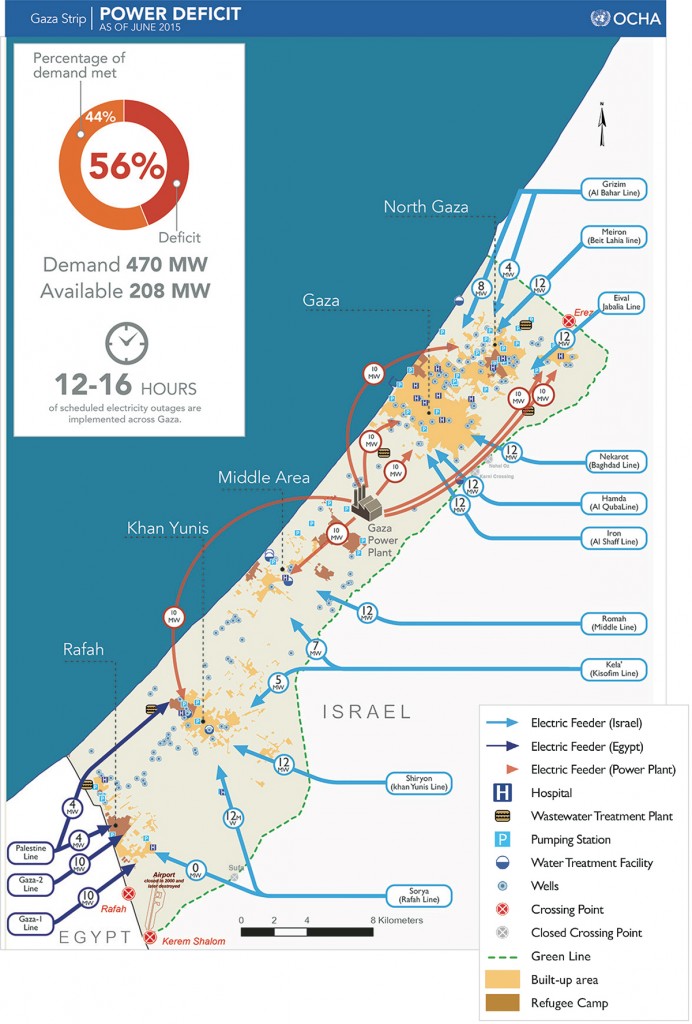No Dialysis Without Electricity in Gaza
Hanine (22) and Ariege (20) are two sisters from Gaza. Since Hanine has donated her kidney to Ariege, their daily rhythm has been designed to be congruent with the schedule of electricity. Continuous power outage is a real threat for Ariege’s life, as she depends on renal dialysis. Hanine considers her sister’s health a top priority and accompanies her to the hospital three times a week for four to five hours. When the hospital is using an electricity generator, sometimes they need seven to eight hours. The home is completely dependent on the two sisters, especially since their mother passed away one year ago. They wake up at four in the morning to do laundry., prepare food, and clean their home before the electricity cuts at six (it alternates: eight hours on and eight hours off) then they get ready to go to their university that starts at 8:00 am. When there is no electricity, these duties are shifted to the evening – to be completed after an exhausting, long day of work. As the university uses a huge generator, it offers a good opportunity to charge the battery of their mobiles and laptop. Visits to relatives and friends are restricted to times when there is no electricity at home, and they end with the expected time of electricity returning. Hanine says: we were using an electricity generator, but due to its high cost and adverse effect on my sister, we do not use it anymore. Hanine adds, “As an older sister, I am really concerned about winter and summer, because I understand the needs of Ariege in hot and cold weather.”
Map courtesy of OCHA. Caption by Haneen Razg.
No Light Tonight!
By Isra’ Migdad
Usually I organize my day according to the electricity schedule, which can be hard and funny and miserable, all at the same time! Often I manage to finish all the work that I have to do and that can be accomplished without electricity – even if I was not in the mood for it – or I simply go to sleep to escape from the harshness of reality. When electricity comes, we celebrate, even though it should be our simple right. I rush to recharge my laptop and my mobile phone, I iron my clothes, turn on the water heater, put the laundry in the washing machine…. I try to finish all the things that need electricity, and feel relief. Long blackout periods and the random, unscheduled electricity cuts are among the toughest challenges in my life. They turn my daily plans upside down and play havoc on my mood. But to cope with the situation, I keep in the back of my mind activities I could do, like read a book, or call a friend, or have fun with my siblings. Sometimes, I spend my time not knowing what to do other than wait for electricity to come. And this usually happens when I really need it. And my feeling from within keeps echoing, “It’s so unfair.”
Coping with Absence
By Enas Fares Gannam
You know how it is when you miss someone a lot, and then he comes? You want to spend all the time with him, you don’t want to waste any moment with him, you want to fully enjoy his company. This, in short, is my relationship with electricity. Eight hours on, eight off is our schedule for electricity in Gaza. It is a blessing, at least every time we receive all of it. After the offensive on Gaza in 2014, we had only four hours a day, for more than three months.
Everything has to move in these precious hours: washing machines, TVs, computers, the charging of laptops and mobiles, and the water pumps! And no matter what time it is, everyone gets up for electricity; it’s like our sacred law. At midnight you can see women doing laundry; students waking up to start their studies, having gone to bed early; some take a shower, as water usually comes with electricity. And sometimes we must do our laundry by hand; there just may be not enough electricity or not enough time.
I tell myself that I don’t have a problem with lacking electricity. In fact, I often work when there is no electricity; I do things by hand. But we miss it during the winter: when it is freezing and we can’t use heaters, when the children fear to go to bathrooms by themselves, when newborn babies die in the cold, when people who used candles and fell asleep wake up burned in hospitals.
But apart from all of this, I tell myself that I have no problem with the electricity being off.


